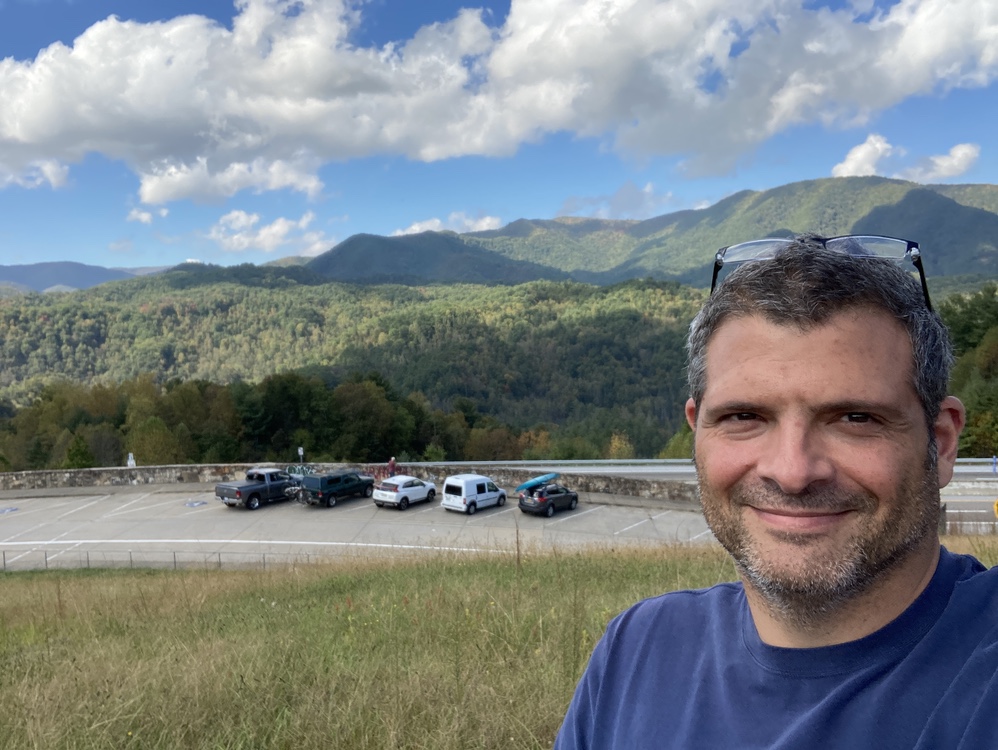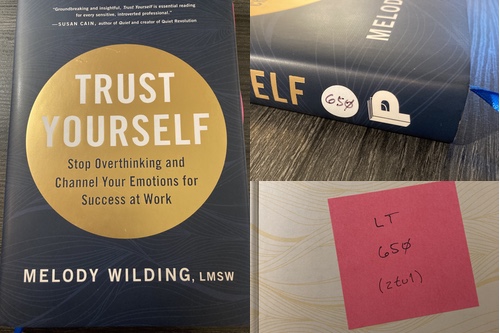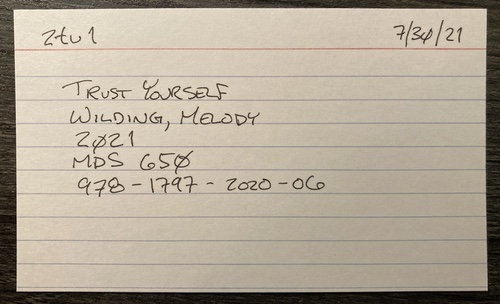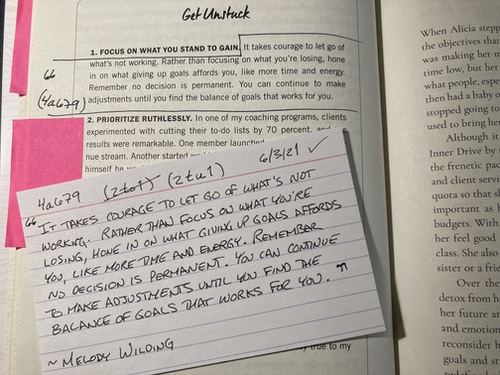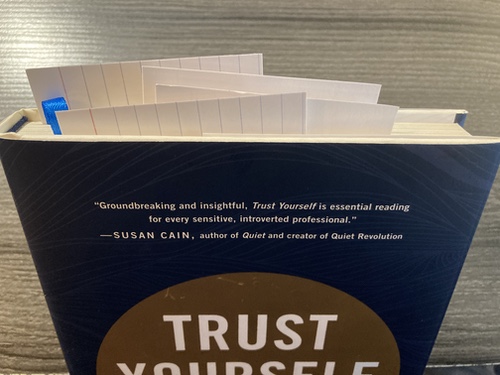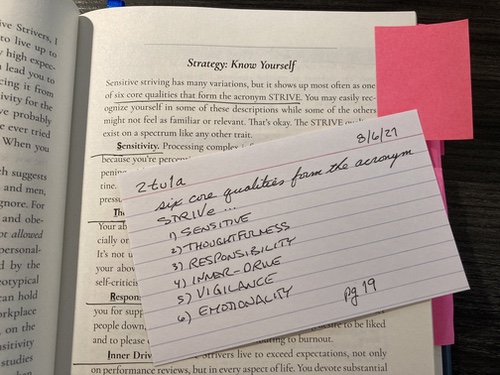Such as are your habitual thoughts, such also will be the character of your mind.
~ Marcus Aurelius
slip:4a185.
I have a series of prompts which are a combination of quotes and small notes I’ve written for myself. I’ve mentioned this a few times in various posts tagged Reflection. As I collect them—pretty rare these days—I record them on slips in the slipbox. In 2019 I posted Daily Reminders describing what I was doing and listed the 42 prompts. Below you will find the current list of 62.
Over the years I’ve taken the time to type them into OmniFocus, the personal productivity software which I use. I carefully created individual “to-dos” for each one, with each scheduled to repeat at just the right number of days, and lined up their initial due dates. Many years later now, every day, one of them comes up digitally as a reflection prompt. While I recognize everyone of them, there are enough of them that I cannot remember which one will be next.
- (4b1) AM I AN ENERGY-GIVER OR -TAKER? — Strive to lift others up; to leave them feeling better than before the encounter. While being mindful of my own energy level, seek ways to create a zest for life in others.
- (4b2) BECOME MINDFUL OF ATTACHMENTS THAT LEAD TO CLUTTER AND COMPLEXITY — For example, if you are attached to sentimental items, you won’t be able to let go of clutter. If you are attached to living a certain way, you will not be able to let go of a lot of stuff. If you are attached to doing a lot of activities and messaging everyone, your life will be complex. ~ Leo Babauta
- (4b3) PERSPECTIVE — “In the meanwhile, while they are robbing and being robbed, while they disrupt each other’s repose and make one another miserable, life remains without profit, without pleasure, without moral improvement. No one keeps death in view, everyone focuses on remote hopes. Some even make posthumous provisions—massive sepulchures, dedications of public buildings, gladiatorial shows, and pretentious obsequies. But the funerals of such people should be conducted by torch and taper light, as though they had in fact died in childhood.” ~ Seneca, On the Shortness of Life
- (4b4) TEMPERANCE — “Eat not to dullness; Drink not to elevation.” ~ Benjamin Franklin
- (4b5) BE PROACTIVE — “While the word proactivity is now fairly common in management literature, it is a word you won’t find in most dictionaries. It means more than meerly taking initiative. It means that as human beings, we are responsible for our own lives. Our behavior is a function of our decisions, not our conditions. We can subordinate feelings to values. We have the initiative and the responsibility to make things happen.” ~ Stephen Covey
- (4b6) LOOK INWARD — “Everybody is too busy with their own lives to give a damn about your book, painting, screenplay, etc., especially if you haven’t sold it yet. And the ones that aren’t [too busy], you don’t want in your life anyway.” ~ Jason Korman
- (4b7) AM I LIKELY TO “ACT” OR “REACT” TO A TASK? — Seek the reason for the task so that it may motivate me to proper action. Otherwise, determine how to eliminate or avoid the task entirely. Do or do not; there is no try.
- (4b8) SILENCE — “Speak not but what may benefit others or yourself; avoid trifling conversation.” ~ Benjamin Franklin
- (4b9) IMPRESSIONS — “But if you have in reality given thought to nothing other than the proper use of impressions, then as soon as you get up in the morning ask yourself, “What do I lack in order to be free from passion? What, to enjoy tranquillity? What am I? Am I a mere worthless body? Am I property? Am I reputation? None of these. What, then? I am a rational creature.” What, then, is required of you? Go over your actions. “Where did I transgress: in relation to peace of mind? What did I do that was unfriendly, or unsociable, or inconsiderate? What have I failed to do that I ought to have done with regard to these matters?” ~ Epictetus, 4.6.34-5
- (4b10) WHAT AM I DOING WHILE ON “THE BENCH”? — If there is somewhere I want to be, begin walking. Identify something which I can do now, or very soon, which is interesting. Remember that efficacy is active, not passive.
- (4b11) BEGIN WITH THE END IN MIND — “Each part of your life can be examined in the context of the whole, of what really matters most to you. By keeping that end clearly in mind you can make certain that whatever you do on any particular day does not violate the criteria you have defined as supremely important, and that each day of your life contributes in a meaningful way to the vision you have to your life as a whole.” ~ Stephen Covey
- (4b12) IMPROVE ONESELF — “So now, are you not willing to help yourself? And how much easier such assistance is! You need not kill, imprison, or assault a man; you need not come into the market-place, you have merely to talk with yourself, the man who will be most readily persuaded, and to whom no one can be more persuassive than yourself. So, in the first place, pass judgement on your actions; but when you have condemned them, do not give up on yourself, nor be like those mean-spirited people who, when they have once given way, abandon themselves entirely, and are, so to speak, swept off by the flood.” ~ Epictetus, 4.9.13-4
- (4b13) DISTRACTION, BUSYNESS AND CONSTANT SWITCHING ARE MENTAL HABITS — We don’t need any of these habits, but they build up over the years because they comfort us. We can live more simply by letting go of these mental habits. What would life be like without constant switching, distraction and busyness? ~ Leo Babauta
- (4b14) ORDER — “Let all your things have their places; let each part of your business have its time.” ~ Benjamin Franklin
- (4b15) NOTICE THE SPACE — “Between stimulus and response there is a space. In that space is our power to choose our response. In our response lies our growth and our freedom.” ~ Viktor Frankl
- (4b16) WHAT CAN I DO TO BE SO GOOD THEY CAN’T IGNORE ME? — Continuous improvement? A “big swing?” A simple but insightful solution? The path to “the best” is not obvious and likely does not pass directly through the most-obvious next thing.
- (4b17) PUT FIRST THINGS FIRST — “The degree to which we have developed our independent will in our everyday lives is measured by our personal integrity. Integrity is, fundamentally, the value we place on ourselves. It’s our ability to take and keep commitments to ourselves, to “walk our talk.” It’s honor with self, a fundamental part of the Character Ethic, the essence of proactive growth.” ~ Stephen Covey
- (4b18) CHOICE — “For there are two rules we should always have at hand: That nothing is good or evil, but choice; and, that we are not to lead events, but to follow them. “My brother ougth not to have treated me so.” Very true, but it is for him to see to that. However he treats me, I am to act rightly with regard to him. For this is my concern, the other is somebody else’s; this no one can hinder, the other is open to hindrance.” ~ Epictetus, 3.10.18-9
- (4b19) AM I AUTHENTIC OR OBSEQUIOUS? — Discerning the difference between obsequiousness and politeness can be difficult, but courtesy should be rooted in benevolence. Politeness should be the expression of a benevolent regard for the feelings of others; it’s a poor virtue if it’s motivated only by a fear of offending good taste. In its highest form Politeness approaches love.
- (4b20) SINGLE-TASK BY PUTTING LIFE IN FULL-SCREEN MODE — “Imagine that everything you do — a work task, answering an email or message, washing a dish, reading an article — goes into full-screen mode, so that you don’t do or look at anything else. You just inhabit that task fully, and are fully present as you do it. What would your life be like? In my experience, it’s much less stressful when you work and live this way. Things get your full attention, and you do them much better. And you can even savor them.” ~ Leo Babauta
- (4b21 ) TAKE ACTION — “Action’s ecstasy is instantaneous and compounding: Even if for the millionth time, it works its magic. Its trigger is sure: All you do is peel your ass off the bottom of whatever hole you are in, and climb!” ~ Bryan Ward
- (4b22) RESOLUTION — “Resolve to perform what you ought; perform without fail what you resolve.” ~ Benjamin Franklin
- (4b23) THINK WIN/WIN — “Most people tend to think in terms of dichotomies: strong or weak, hardball or softball, win or lose. But that kind of thinking is fundamentally flawed. It’s based on power and position rather than on principle. Win/Win is based on the paradigm that there is plenty for everybody, that one person’s success is not achieved at the expense or exclusion of the success of others.” ~ Stephen Covey
- (4b24) CONCENTRATION — “It takes but a little to destroy and overturn everything, just a slight deviation from reason. To overturn his ship, a helmsman does not need the same proficiency as he does to keep it safe, but, if he turns it a little too far into the wind, he is lost: and even if he does not do so deliberately, but simply loses his concentration for a moment, he is lost. Such is the case here too. If you nod off for just a moment, all that you have acquired up till then is gone.” ~ Epictetus, 4.3.4-6
- (4b25) HOW DO I TREAT SOMEONE I DON’T KNOW? — Your character shows in how you treat those who can do nothing for you.
- (4b26) FRUGALITY — “Make no expense but to do good to others or yourself; i.e., waste nothing.” ~ Benjamin Franklin
- (4b27) NOPE —
I will not be lazy.
I will not accept what I have now if I know I can do better.
I will not sleep until I finish.
I will not leave until I am done.
I will not tremble in front of new challenges.
I will not stop until I stop breathing.
I will be whatever I want to be
even if it takes sacrifice
even if I have little to give
even if it takes time
even if I have no time at all.
I will succeed.
~ (unknown) - (4b28) SEEK FIRST TO UNDERSTAND, THEN TO BE UNDERSTOOD — “You’ve spent years learning how to read and write, years learning how to speak. But what about listening? What training or education have you had that enables you to listen so that you really, deeply understand another human being from that individual’s own frame of reference?” ~ Stephen Covey
- (4b29) CREATE SPACE BETWEEN THINGS — “Add padding to everything. Do half of what you imagine you can do. What would it be like if we did less? What would it be like if we padded how long things took, so that we have the space to actually do them well, with full attention? What would it be like if we took a few minutes’ pause between tasks, to savor the accomplishment of the last task, to savor the space between things, to savor being alive?” ~ Leo Babauta
- (4b30) OUTSIDE OUR CONTROL — “If you should ever turn your will to things outside your control in order to impress someone, be sure that you have wrecked your whole purpose in life. Be content, then, to be a philosopher in all that you do, and if you wish also to be seen as one, show yourself first that you are and you will succeed.” ~ Epictetus
- (4b31) INDUSTRY — “Lose no time; be always employ’d in something useful; cut off all unnecessary actions.” ~ Benjamin Franklin
- (4b32) SYNERGIZE — “What is synergy? Simply defined, it means that the whole is greater than the sum of its parts. It means that the relationship which the parts have to each other is a part in and of itself. It is not only a part, but the most catalytic, the most empowering, the most unifying, and the most exciting part.” ~ Stephen Covey
- (4b33) MUCH ABIDES —
Tho’ much is taken, much abides; And tho’
we are not now that strength which in old days
moved Earth and Heaven, that which we are, we are;
one equal temper of heroic hearts,
made weak by time and fate, but strong in will
to strive, to seek, to find, and not to yield.
~ Alfred Lord Tennyson - (4b34) IS THERE AN ELEMENT OF STRUGGLE IN MY HISTORY? — This reminds me to be kind, for everyone I meet is working through their own struggle. Through the experience of my own struggle I can better understand and empathize with others on similar journeys. Furthermore, being reminded of my past struggles suggests perspective on my day-to-day general lack of struggle.
- (4b35) MY OATH — Today is the first day of the rest of my life. I shall make no excuses and hold no grudges. I care not where I came from, only where I am going. I don’t compare myself to others, only to myself from yesterday. I shall not brag about successes nor complain about my struggles, but share my experiences and help my fellows. I know I impact those around me with my actions, and so I must move forward, every day. I acknowledge fear, doubt, and despair, but I do not let them defeat me.
- (4b36) HONESTY — “I am unafraid as I prepare myself for that day when the artifices and disguises will be stripped away and I shall make judgement of myself. Is it just brave talk, or do I mean what I say? Were they for real, those defiant words I spoke against fortune, or were they just theatre—just acting a part?” ~ Seneca
- (4b37) SINCERITY — “Use no hurtful deceit; think innocently and justly, and, if you speak, speak accordingly.” ~ Benjamin Franklin
- (4b38) SHARPEN THE SAW — “It’s preserving and enhancing the greatest asset you have–you. It’s renewing the four dimensions of your nature: physical, spiritual, mental, and social/emotional. … “Sharpen the saw” means expressing all four motivations. It means exercising all four dimensions of our nature, regularly and consistently in wise and balanced ways.” ~ Stephen Covey
- (4b39) SELF-COMPASSION — Beware the stern, vociferous, insistent, internal critic. In my head, it sounds like me, but it is not me. If I said to another, even a fraction of the things I say incessently to myself, I would be arrested, or more likely, assaulted.
- (4b40) WHAT HAVE I BEEN READING? — I’ve performed this experiment countless times. Read little: nothing happens. Read more: ideas, new connections, inspiration, questions, motivation, short-cuts, wonder.
- (4b41) JUSTICE — “Wrong none by doing injuries, or omitting the benefits that are your duty.” ~ Benjamin Franklin
- (4b42) BEFITTING A HUMAN BEING — “What would you wish to be doing, then, when death finds you? For my part, I would wish it to be something that befits a human being, some beneficient, public-spirited, noble action. But if I cannot be found doing such great things as these I should like at least to be doing that which cannot be impeded and is given me to do, namely, correcting myself, improving the faculty that deals with impressions, toiling to achieve tranquillity, and rendering to the several relationships of life their due; and, if I am so fortunate, advancing to the third area of study, that which deals with the attainment of secure judgements.” ~ Epictetus, 4.10.12-3
- (4b43) FIND JOY IN A FEW SIMPLE THINGS — “For me, those include writing, reading/learning, walking and doing other active things, eating simple food, meditating, spending quality time with people I care about. Most of that doesn’t cost anything or require any possessions. To the extent that I remember the simple things I love doing, my life suddenly becomes simpler.” ~ Leo Babauta
- (4b44) MODERATION — “Avoid extremes; forbear resenting injuries so much as you think they deserve.” ~ Benjamin Franklin
- (4b45) FAULT — “So is it possible to be altogether faultless? No, that is impractical; but it is possible to strive continuously not to commit faults. For we shall have cause to be satisfied if, by never relaxing our attention, we shall escape at least a few faults. But as it is, when you say, “I will begin to pay attention tomorrow,” you should know that what you are really saying is this: “I will be shameless, inopportune, abject today; it will be in the power of others to cause me distress; I will get angry, I will be envious today.” See how many evils you are permitting yourself. But if it is well for you to pay attention tomorrow, how much better would it be today? If it is to your advantage tomorrow, it is much more so today, so that you may be able to do the same again tomorrow, and not put it off once more, to the day after tomorrow.” ~ Epictetus, 4.12.19-21
- (4b46) WOULD I WANT TO GO ON A LONG CAR RIDE WITH ME? — Long car rides are a quintessential American experience. Along with the good however, comes the opportunity for bad. With others present the confined space, lack of privacy, and monotony of rolling vistas create a microcosm of life on a tiny stage. How I share that stage with the others in the car, and what specifically I do while on that stage tells all.
- (4b47) GET CLEAR ABOUT WHAT YOU WANT, AND SAY NO TO MORE THINGS — “We are rarely very clear on what we want. What if we became crystal clear on what we wanted in life? If we knew what we wanted to create, how we wanted to live … we could say yes to these things, and no to everything else. Saying no to more things would simplify our lives.” ~ Leo Babauta
- (4b48) CLEANLINESS — “Tolerate no uncleanliness in body, clothes, or habitation.” ~ Benjamin Franklin
- (4b49) AM I SELF-AWARE? — The first step in my journey was realizing I was unhappy. This realization — detecting it, understanding it, believing it, surrendering to it, and finally owning it — was the first piece of bedrock on which I started building.
- (4b50) TRANQUILLITY — “Be not disturbed at trifles, or at accidents common or unavoidable.” ~ Benjamin Franklin
- (4b51) PRACTICE DOING NOTHING, EXQUISITELY — “No need to plan, no need to read, no need to watch something, no need to do a chore or eat while you do nothing. You will start to notice your brain’s habit of wanting to get something done. This exposes our mental habits, which is a good thing. Keep doing nothing. Sit for awhile, resisting the urge to do something. After some practice, you can get good at doing nothing, and this leads to the mental habit of contentment and gratitude.” ~ Leo Babauta
- (4b52) CHASTITY — “Rarely use venery but for health or offspring, never to dullness, weakness, or the injury of your own or another’s peace or reputation.” ~ Benjamin Franklin
- (4b53) WHAT IS MY TALK-TO-LISTEN RATIO? — It’s better to listen to understand, rather than to, (for example,) listen to refute. Silence is fine provided one’s own thoughts are pleasant company. When speaking, think first about why you are about to say whatever it is you’re about to say.
- (4b54) WE CREATE OUR OWN STRUGGLES — “All the stress, all the frustrations and disappointments, all the busyness and rushing … we create these with attachments in our heads. By letting go, we can relax and live more simply.” ~ Leo Babauta
- (4b55) HUMILITY — Imitate Socrates.
- (4b56) FESTINA LENTE — Make haste, slowly. Or, unrestrained moderation. — “The worker must be stronger than his project; loads larger than the bearer must necessarily crush him. Certain careers, moreover, are not so demanding in themselves as they are prolific in begetting a mass of other activities. Enterprises which give rise to new and multifarious activities should be avoided; you must not commit yourself to a task from which there is no free egress. Put your hand to one you can finish or at least hope to finish; leave alone those that expand as you work at them and do not stop where you intended they should.” ~ Seneca, On Tranquility
- (4b57) LOOK BACK — Look back at some of the things you’ve accomplished or experienced and think… — “Well if that isn’t nice, I don’t know what is.” ~ Kurt Vonnegut — “One never notices what has been done; One can only see what remains to be done.” ~ Marie Curie
- (4b58) MIND YOUR OWN — “Not to support this side or that in chariot-racing, this fighter or that in the games. To put up with discomfort and not make demands. To do my own work, mind my own business, and have no time for slanderers.” ~ Marcus Aurelius, med 1.5
- (4b59) HOW TO ACT — “Never under compulsion, out of selfishness, without forethought, with misgivings. Don’t gussy up your thoughts. No surplus words or unnecessary actions. Let the spirit in you represent a man, an adult, a citizen, a Roman, a ruler. Taking up his post like a soldier and patiently awaiting his recall from life. Needing no oath or witness. Cheerfulness. Without requiring other people’s help. Or serenity supplied by others. To stand up straight—not straightened.” ~ Marcus Aurelius, med 3.5
- (4b60) PERSPECTIVE — “Be willing to be a child and be the Lilliputian in the world of Gulliver, the bat-girl in Yankee Stadium. That’s a more fruitful way to be.” ~ Mary Karr
- (4b61) MEMENTO MORI — “Not to live as if you had endless years ahead of you. Death overshadows you. While you’re alive and able—be good.” ~ Marcus Aurelius, med 4.17
- (4b62) EMBRACE THE OBSTACLES — “External things are not the problem. It’s your assessment of them. Which you can erase right now. If the problem is something in your own character, who’s stopping you from setting your mind straight? And if it’s that you’re not doing something you think you should be, why not just do it? —But there are insuperable obstacles. Then it’s not a problem. The cause of your inaction lies outside you. —But how can I go on living with that undone? Then depart, with a good conscience, as if you’d done it, embracing the obstacles too.” ~ Marcus Aurelius, Meditations 8.47
ɕ


